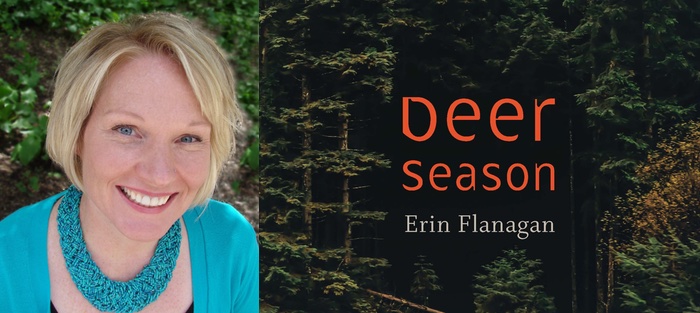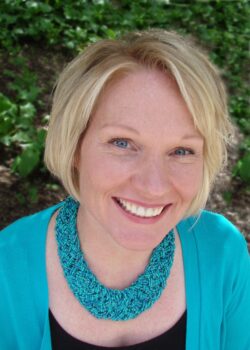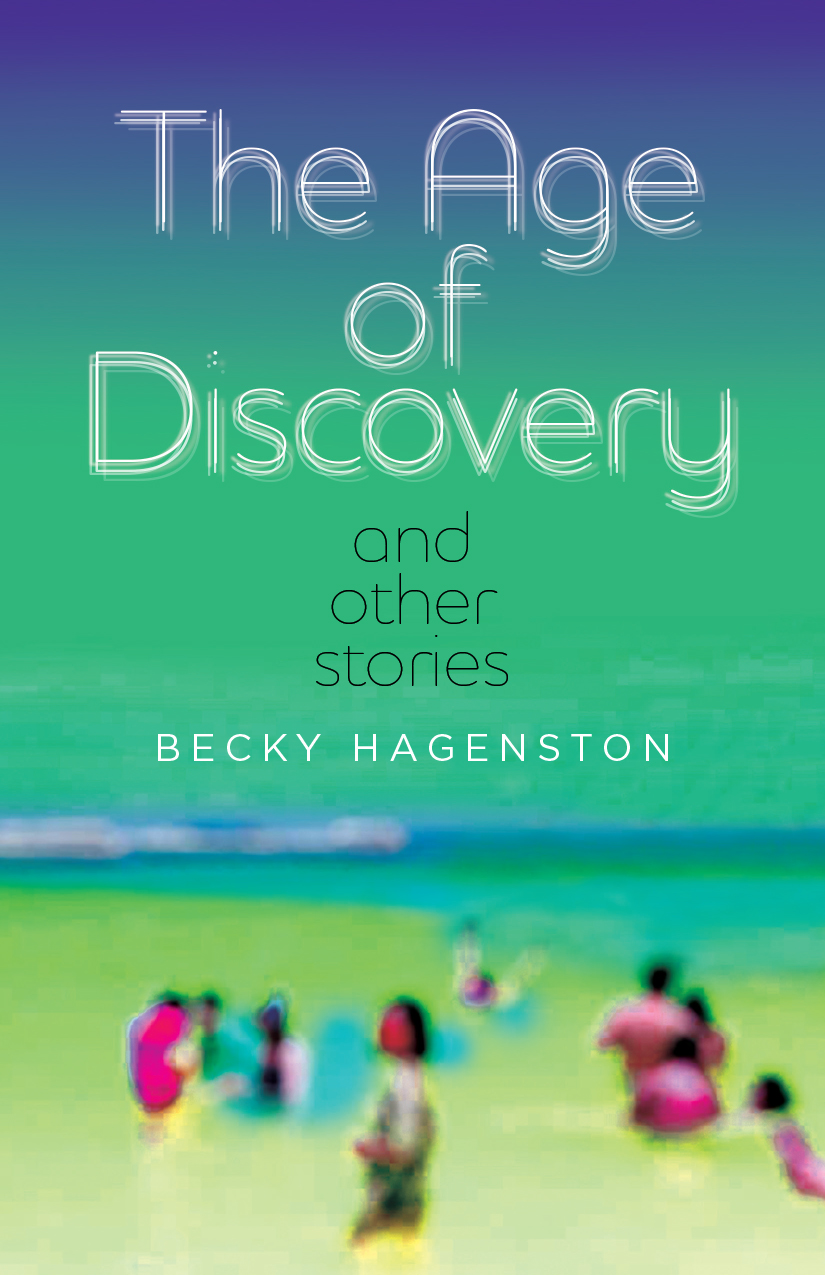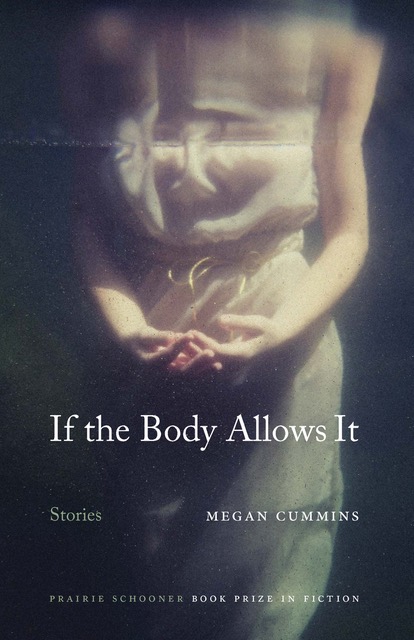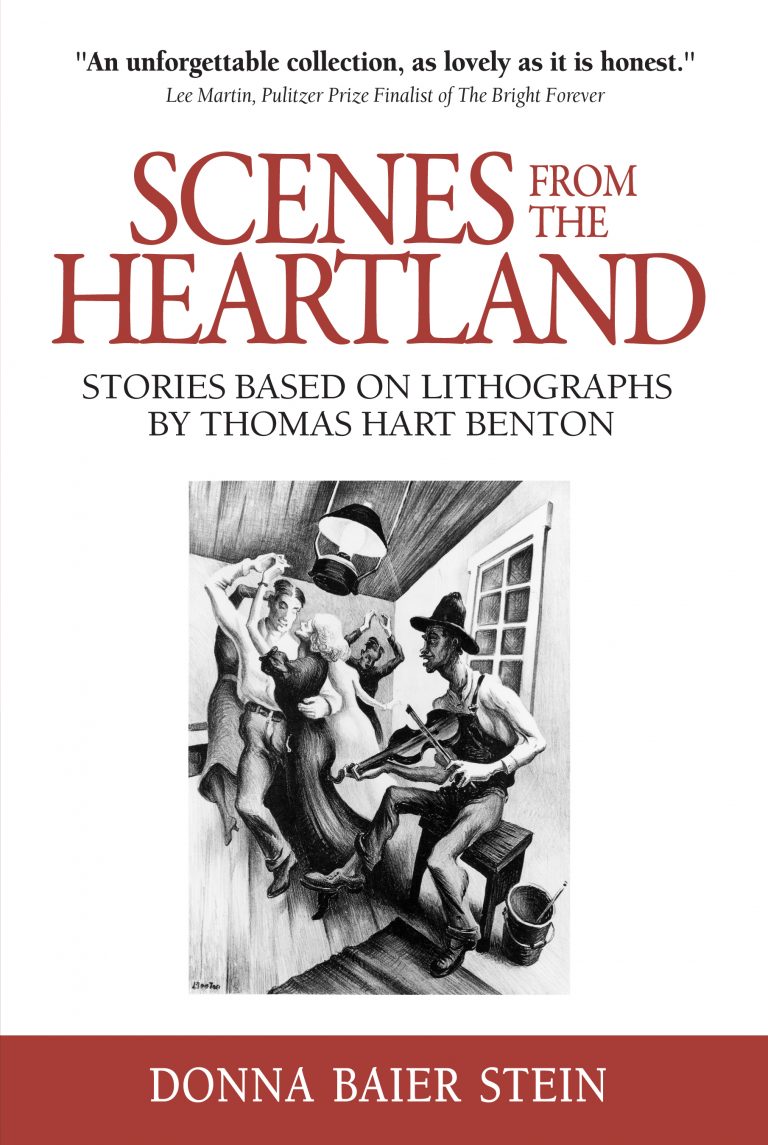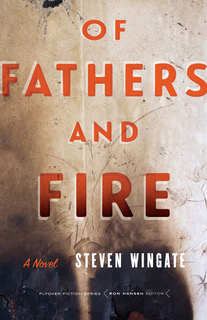Erin Flanagan’s debut novel, Deer Season, is a character-driven whodunit set in the town of Gunthrum, Nebraska, in the mid-’80s. After local teenager Peggy Ahern goes missing, intellectually disabled farmhand Hal Bullard—who has some violence in his past—gets drawn into the center of the storm. Alma and Clyle Costagan, Hal’s protective caretakers and employers, must navigate their roles in the drama as carefully as Hal must navigate his own. The backdrop of Guthrum is a character, as well. Brimming with secrets, coldness, and life before technology opened the world up to nearly every corner, Gunthrum still manages to remind its inhabitants that they will always carry that small town with them.
When I was a student of Flanagan’s at Wright State University, she told us, “Your characters are smarter than you.” Those words taught me to stop projecting my own thoughts or fears or insecurities onto the work I do—to let the work spring forth, to listen closely, and trust more quickly—and it is evident throughout Deer Season that this advice was more than the hollow musings in a creative writing classroom in the Midwest. In this novel the reader will find the honesty, hard work, and humor that Erin Flanagan pours onto each page.
In addition to Deer Season, published this fall by the University of Nebraska Press as part of its Flyover Fiction Series, Erin Flanagan is also the author of two previous collections of short stories: The Usual Mistakes (2005) and It’s Not Going to Kill You and Other Stories (2013). Flanagan has held fellowships at Yaddo, MacDowell Colony, Sewanee Writers’ Conference, Bread Loaf Writers’ Conference, Ucross, and Vermont Studio Center, and she is a professor at Wright State University.
Interview:
Dylan Colvin: I remember you telling our class that the characters we write are smarter than us. It has stuck with me in so much of what I do—in teaching it has reminded me to be more trusting, in life it has reminded me to not force in what didn’t fit (no matter how much I may want it to), and in research/writing it has put me in my place more than one. Deer Season has so many smart characters. Obviously, Milo and Alma come to mind first. But even the characters that make unwise decisions have an intelligence about their surroundings or their wants/needs that is remarkable. Can you talk a little bit about the work of allowing your characters to be smarter than you?
Erin Flanagan: Nothing could delight me more than you taking that from our classes! I really do believe the story is its own living, breathing thing that’s coming to life, and it holds so many answers if we’ll just step back and listen. I also find the thought of the story being smarter than the writer somewhat comforting. Like, thank goodness I’m not the smartest one here.
And I’m so happy you think these characters come off as smart, because I think of them that way. There are of course things they can’t see because of their perspective, such as Milo as a child, or Hal given his intellectual capacities, but I agree that everyone has an inherent intelligence, and especially an emotional intelligence that can serve them well. I’m not a fan of fiction where the writer is looking down on or poking fun at their characters, or acting like they’re dumb or judging their actions. I don’t think it’s fair. As I’m starting off with a character, I don’t want them grappling with something they might have already figured out, because I’ll end up writing down to them then. For instance, if I’m writing a character and think, but don’t I want them self-aware or smart enough to already have realized X about themselves? then I write in that knowledge and keep pushing to see what it is they don’t realize yet that will surprise both them and me. If I don’t allow them what I’ve already figured out, I’m once again saying I’m smarter, so I won’t push to something new.
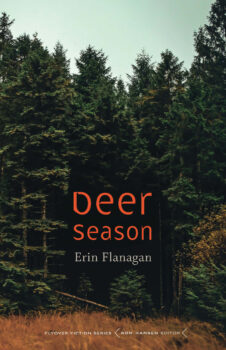 I’m interested in the research process that goes into writing a novel. How does researching, say, policing practices in a missing persons case, shape or constrain the novel? How does research allow the reader to feel familiar without making things dull or mundane? Further, how can it allow for all the possibilities of what could be while staying within believability?
I’m interested in the research process that goes into writing a novel. How does researching, say, policing practices in a missing persons case, shape or constrain the novel? How does research allow the reader to feel familiar without making things dull or mundane? Further, how can it allow for all the possibilities of what could be while staying within believability?
I don’t have the love of research that some writers have, but still I understand the safety of the rabbit hole. For me it’s like, let me just make sure I’ve got this right or understand this procedure so I don’t actually have to move forward. It’s very seductive. But I’m also a writer who works things out on the page, so usually what I do is some not very heavy research to get the big picture (I’m talking Wikipedia and the first five google searches) then write some dumb draft and fix it later. But when I do get to the deeper dive, I’m always shocked what research gives me. It makes me realize the limits of my own imagination.
For instance, in Deer Season, I had to research hunting licenses and found out they’re not just issued state wide in Nebraska and that hunters have to go through checkpoints. This gave me some excellent stuff for the plot—reasons Hal might be nervous about what kind of license he had, where he and the other men went hunting for the weekend and why, and so on. Research really is a gift.
The next book I have coming out, Blackout, is my first with deeper research, and into neuroscience of all things, so we’ll see how I pulled it off. Luckily, again, I certainly don’t think I’m the smartest person in the room so I asked a neuroscientist to read a draft for me and he was very generous and helpful in his feedback.
This makes me think about the role of interdisciplinary work and what we can give to each other as we create. What opportunities do you see for being intentional about that work in academic spaces or spaces where writers work together?
People across disciplines have been incredibly generous. I’ve interviewed social workers, nurses, social media specialists, people at hunting and gaming organizations, and others, and so many people have taken the time to speak with me and answer questions. Some of these connections came through academia, but a lot were just me cold calling or emailing randos who knew things, so if someone isn’t connected to a university, that’s not a problem. I think many people see the role of art and writing as important in our society and want to help with that, and also want to see their professions and interests represented accurately and fairly.
As far as finding a space where writers come together and form a literary community, I’d say this is one of the best things you can do for yourself as a writer. Find your people. They’ll commiserate with you through the ups and downs, help you figure out tricks to keep going, and help you figure out the business side of all this. For instance, I would never have finished Deer Season without my good friend Jess Montgomery telling me how she uses excel to map her timeline. I was totally stymied, and this helped me break through.
The real joy then comes when you move up the ladder and you can pull writers up behind you. You can pass on that encouragement and what you’ve learned, and offer blurbs or reviews or to do readings together or whatever.
You grew up on a farm, right? Are there similarities between you and Milo? How does the process of researching oneself/own life work within fiction?
I did grow up on a farm! In rural Iowa in the ’80s, which was one reason I wanted to set the book then. I can hardly imagine how much my town has changed since that time, and I really wanted to capture what that was like before the internet and cell phones. The feeling of not having access to the larger world.
I definitely see similarities between myself and Milo in that we didn’t really fit the mold for our small towns. We had older sisters who did—popular, beautiful, athletic—which left us with the role of weird kid which we both stepped into. I’m lucky though in that nothing ever happened to Kelly, my actual sister, and the best sister a misfit could ask for. I think so much of fiction is that “what if” question. What if something bad had happened when I was growing up in this insular, safe town? What if the town turned on one of its own?
Something that drew me into the novel were the “opposing” themes of motherhood and childhood—especially how not so opposing they are. There is all this becoming and grieving and invisibleness within the novel, especially between the two “opposing” families of Milo with his mother and Alma and Hal. These seeming oppositions are weaved beautifully throughout the novel. Can you speak to what it was like to develop these characters and moments?
Motherhood and childhood were definitely concepts that I wanted to explore in the novel—how they’re linked, complicated, and what they reveal about each other. I think you’re absolutely right about the invisibility that overlaps mothers and children in the book. Once Peggy goes missing, Milo really knows what it’s like to not be seen by his worried parents as they spend all their energy looking for his sister or trying to hide her disappearance. Milo’s mom is taken for granted by everyone in the family and never allowed to put her own needs first. Alma has a similar fate in that no one in Gunthrum really sees her and gets to know her, and then eventually even her own husband ends up not seeing her.
I wasn’t thinking so much invisibility as lack of agency, but of course those go hand in hand. In the ’80s, a lot of women were still really struggling with that. I mean, ha, most women are struggling with it today. It’s the men in the novel like Clyle and Joe Ahern that get to have some say over their lives, and by extension, the lives of their wives and families. This isn’t true of Hal though, who’s just at the mercy of other people’s whims as a child might be. It made me so sad they wouldn’t recognize him as a man and recognize him for his capacities.
In many ways the town of Gunthrum is a central character. The work describing the space and how the characters navigate their place within it works to pace the novel. Can you talk about this element of the book?
I’ll say this: if you ever want to visit a version of Gunthrum, go to Sanborn, Iowa. While the people aren’t a match, the layout of the town is very similar: the bank on Main, Gunthrum Foods, the K-12 school all in one building. It’s the town where I grew up, and it made it so much easier for me to visualize it as I was writing, but it never even occurred to me to try and use Sanborn as the actual setting. I didn’t want anyone saying, “You know so-and-so worked at Sanborn Foods at the time. Do you think she gossiped as much as Lana?” I didn’t want anyone thinking the characters in the story were based on real people, or try to assign some of the characters less upstanding actions to people in Sanborn.
I was very conscious of wanting Gunthrum to seem like a real place, because the small, rural feel is so central to the book. This is not a story that can take place in a big city, although I’m sure within many cities there are close-knit neighborhoods that feel like that. But I wanted to capture how, when I lived in Sanborn, it felt both claustrophobic and safe. Everyone knew my business and they were not afraid to call my mom on the phone if I acted out, but along with that, they kept an eye on me. I really did grow up pretty unaware of a lot of bad things in the world. I was a kid; I didn’t watch the news or read the paper. I don’t think that’s possible anymore, even in Sanborn. It was another reason I set the book in the ’80s.
I was also very aware that things were happening in public versus behind closed doors, and I hoped those public scenes would carry a different kind of heat. For the characters, there was always the question of who was watching and how that scene would be retold and reconfigured, so my hope was the scenes in Gunthrum would carry more tension, or a different kind of tension. I don’t think there’s a scene in town that doesn’t get misconstrued in some way or another by a different character.
I love how the work of secrets plays within the novel. Secrets drive the town in ways that unite and divide. They are sometimes sweet and sometimes violent. Sometimes these are secrets that the characters keep from even themselves. What is it like to be the weaver and keeper of these secrets?
I admit, transitioning from short stories to novels, this weaving was the hardest thing for me. Stories happen so quickly they’re more about the revealing of secrets, while novels are about drawing secrets out and adding more to keep the tension high. Once I had a full draft, I outlined the novel in terms of secrets and plot points, marking on what page the tension was introduced and when it was resolved. Too many times in the first draft it was like: tension page 10, resolution page 13. So I really had to figure out a way to sustain those secrets and complicate them, rather than just saying, thank goodness that’s taken care of. I am not a big fan of secrets or conflict in my own life, but a novel is all about balancing those things and wringing them for everything you can. Maybe that’s why I’m so happy to step away from the computer and just pet my dogs and love on my family. Keep the drama to the pages, thank you!

